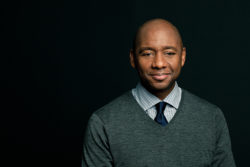Branford Marsalis
Branford Marsalis and his family were recipients of the 2011 National Endowment for the Arts Jazz Masters Award, the nation's highest honor for jazz musicians.

Courtesy of Wilkins Management
Branford Marsalis. Anderson, Eric Ryan (Photographer)
Branford Marsalis is an internationally famous saxophonist and musician known mainly for his jazz recordings and concerts with his own group and his brother Wynton’s band. He has recorded and toured with Sting and the Grateful Dead, among other pop and rock musicians, as well as with classical ensembles including the symphony orchestras of Chicago, Detroit, and Dusseldorf, Germany, and the Boston Pops Orchestra. Marsalis’s profile grew when he took the music director’s chair for The Tonight Show with Jay Leno in 1992. A three-time Grammy award winner, he is also known for his educational efforts across the United States and his charitable work with Habitat for Humanity after Hurricane Katrina.
Branford Marsalis was born in 1960 in Breaux Bridge, Louisiana, to parents Delores and Ellis Marsalis, also a renowned pianist and teacher. His siblings are Wynton, Delfeayo, Jason (all musicians), Ellis III, and Mboya Kinyatta. He grew up in New Orleans and studied at both the New Orleans Center for Creative Arts and Berklee School of Music in Boston. In 1980, he left school to tour with Clark Terry and then Art Blakey. From 1982 to 1985, he played tenor and soprano saxophone in his brother Wynton’s band, which recorded several acclaimed albums including Black Codes From the Underground (1985). He also performed on the Fathers and Sons (1982) release with his father and brothers and drummer James Black, as well as his first solo recording, Scenes of the City (1984). These recordings did much to establish both Branford and Wynton as the leading musicians of the “Young Lions” classic jazz revival during the 1980s. Branford split from his brother to record and tour with Sting on his Dream of the Blue Turtles (1985) album and Bring On The Night (1986) album and tour. Marsalis added sophistication to Sting’s newer songs and rearrangements of tunes by Sting’s previous band, The Police. At the same time, Branford’s career choice caused some well-publicized, temporary friction with Wynton. He continued to record intermittently with Sting until 1999.
After leaving Sting, Marsalis started his own groups, the Branford Marsalis Trio and Quartet. Their first recordings for Columbia Records included Trio Jeepy (1989) and The Beautyful Ones Are Not Yet Born (1991). These recordings contained both catchy, more accessible work and longer form pieces reflecting the influence of Wayne Shorter and John Coltrane. He also teamed up with blues musicians B.B. King, John Lee Hooker, Linda Hopkins, and Joe Louis Walker for the album I Heard You Twice the First Time, which won a Grammy in 1992 for best instrumental jazz performance. That same year, Branford became the first music director for The Tonight Show. Exchanging more banter with host Jay Leno than performing music, Marsalis stayed for two years.
When he left The Tonight Show, Marsalis started a funk/hip-hop band, Buckshot LeFonque, which released two albums, Buckshot LeFonque (1994) and Music Evolution (1997). All the while, he continued his jazz recordings, including the quartet-based Requiem (1998), an adventurous set dedicated to the Quartet’s late pianist Kenny Kirkland, and Contemporary Jazz (1999), which mixes a great sense of swing with its unpredictable shifts. The latter won a Grammy for Best Jazz Instrumental Album.
Branford Marsalis also began concentrating more on his classical playing. In 2001, he recorded a set of early twentieth-century French compositions titled Creation, with the Orpheus Chamber Orchestra of New York. This critically acclaimed CD led to numerous concerts with classical ensembles.
In 2002, Marsalis left Columbia Records and started his own label, Marsalis Music, releasing critically acclaimed albums by young musicians including alto saxophonist Miguel Zenón and vocalist Claudia Acuña, along with veterans like pianist/vocalist Harry Connick Jr. and clarinetist Alvin Batiste. Marsalis has continued releasing his own recordings on Marsalis Music. Footsteps of Our Fathers (2002) pays tribute to John Coltrane, Sonny Rollins, Ornette Coleman, and John Lewis; Romare Bearden Revisited (2003) is dedicated to the African-American painter; Eternal (2004) features Marsalis on soprano as well as tenor saxophone; Braggtown (2006) and Metamorphosen (2009) are highly acclaimed, tight recordings by the quartet of Jeff “Tain” Watts, Joey Calderazzo, and Eric Revis, whose combined experience together has made them into one of the premier jazz bands in the world. Their lyrical and dynamic sense and acute manner of reacting to one another comes through in their live performance of “A Love Supreme,” recorded in Amsterdam in 2004, and their deep and intense set at the New Orleans Jazz and Heritage Festival the day after Marsalis’s teacher Alvin Batiste died in 2007. Marsalis and his family received a Jazz Masters Fellowship from the National Endowment for the Arts in 2011.
In addition to his music, Marsalis has worked on movies and plays, including appearing in a small role in Spike Lee’s School Daze and composing the score for a revival of August Wilson’s Fences, for which Marsalis was nominated for a 2010 Tony Award and won a Drama Desk Award. Marsalis has participated in music residencies at Michigan State, San Francisco State, and Stanford universities as a part of his “Marsalis Jams,” a program he designed based around open jam sessions and concerts. His most comprehensive programs have occurred at North Carolina Central University and the Berklee School of Music. He is known for his humanitarian activities as well, serving as chair of the New Orleans Habitat for Humanity project to rebuild the city after Hurricane Katrina and, with Harry Connick Jr., spearheading construction of the Musicians Village in New Orleans.
